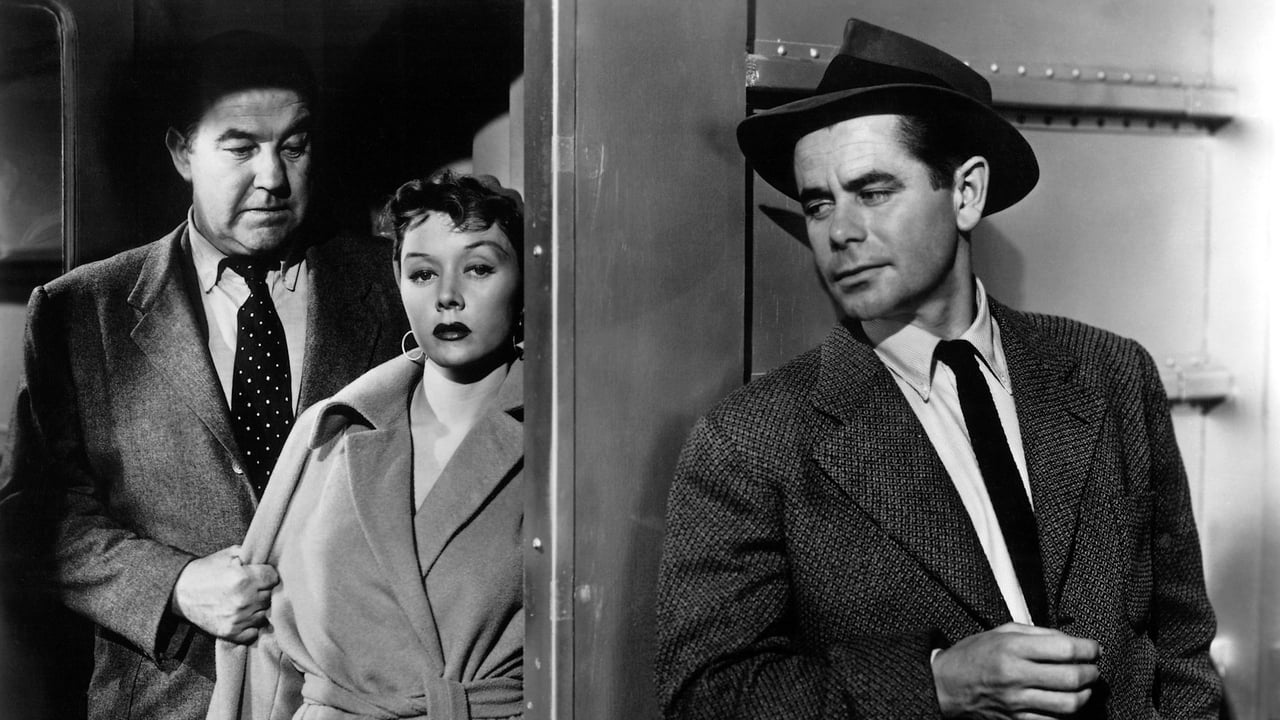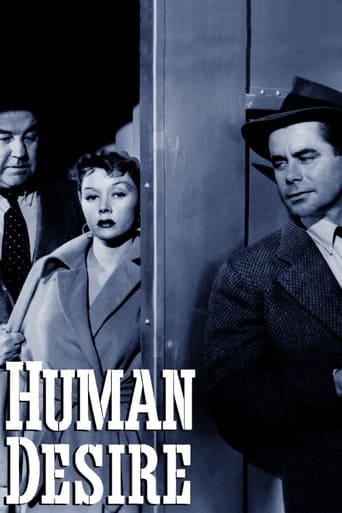Diagonaldi
Very well executed
Konterr
Brilliant and touching
KnotStronger
This is a must-see and one of the best documentaries - and films - of this year.
Robert Joyner
The plot isn't so bad, but the pace of storytelling is too slow which makes people bored. Certain moments are so obvious and unnecessary for the main plot. I would've fast-forwarded those moments if it was an online streaming. The ending looks like implying a sequel, not sure if this movie will get one
BogartsGhost
Fritz Lang's Human Desire is well worth the watch for any fan of film noir, as it is truly competent in that respect. Glenn Ford and Gloria Grahame are back together following the superbly good The Big Heat a year earlier, although this time the result isn't nearly as interesting. Grahame as the femme fatale is the high point of this movie for me, Glenn Ford certainly doesn't disappoint, and although I was never a big fan of Broderick Crawford, his performance here is apt.These back-to-back movies starring Glenn Ford and Gloria Grahame remind me of Lang's earlier works, The Woman in the Window and Scarlet Street, both starring the wonderful Edward G. Robinson and Joan Bennett in some of the finest film noirs out there.Thinking of that connection, I can't help but compare the ending of The Woman in the Window to the ending of Human Desire. The former's ending left me flabbergasted; I won't spoil it, but it made my jaw drop. Some would say it was a terrible ending, but I don't think so when considering the limitations of the Hays code back then. In that context, I feel like the ending of The Woman in the Window was the best choice Lang could have made to avoid compromising the story.The ending of Human Desire, however, is utterly disappointing. It can hardly be said to be an ending at all, as it feels more like the result of the production running out of money, time or creativity than anything else. What's even stranger is how this ending ties in with the Hays code limitations considered earlier. Granted, this is much later than The Woman in the Window, but unless I'm mistaken, the film still fell under the code's scrutiny; from what I read, the nail in the coffin only came in 1959 with films like Some Like It Hot. Suffice to say, the bad guy gets away with it in this one, although this doesn't feel remotely satisfying or interesting, more like an afterthought.Regardless of the poor ending, Human Desire is still well worth the watch and is a fine example of later film noir.
AudioFileZ
First billing on Human Desire goes to Glenn Ford, but he's somewhat eclipsed by Gloria Grahame. Grahame as Vicky Buckley is a cross between a femme fa tale and a bullied and oppressed wife. While not a classic beauty she exudes a kind of striking combination of a sultry sexuality and a "girl next door" with a babyish voice to further complicate the juxtaposition. She most definitely can play the role she's given here standing toe-to-toe with both Ford and Broderick Crawford as her husband Carl. Vicky is at once damaged, devious, and extremely manipulative and Grahame delivers it in spades. Human Desire is a combination of film noir and a romantic drama. Named quite correctly the movie shows how certain innate desires can trip up otherwise solid people. Without haste the marriage between Carl and Vicky becomes a loveless match of wills. Even though Carl suspects Vicky of having an affair with the older wealthy John Owens he forces Vicky to meet him and ask for his influence in getting back the job Carl lost. This sets up Carl's rage when he once more accuses Vicky of a tryst with Owens as she was simply gone too long.In a jealous calculated murder plot Carl gets the upper hand on his wife with a note in order to lure Owens into a trap. It's implied he knows he is going to kill Owens while holding the letter framing Vicky. Carl will, thus, prevent Vicky from leaving for fear of being implicated in the murder.. But, instead of controlling his wife Carl is losing her to returning veteran and railroad engineer Jeff Warren played by Glenn Ford. Warren becomes intertwined in the whole mess by a kiss with Vicky Buckley prior to knowing who and what she is. Before he can figure out he is getting played, Warren decides to testify in an inquiry that he couldn't identify the passenger (Vicky) he may have witnessed, possibly involved in the murder of John Owens. Now, Jeff Warren is in deep being blinded by his budding love (i.e. lust) for Vicky, much to her design. Things get messier before Warren gets his own personal reality check as he truly contemplates murdering Carl Buckley to both save Vicky and have her for his wife. This plays out quite well as the love triangle of Carl, Vicky, and Jeff Warren comes to a critical mass. There's a good twist at the end when at least Vicky, who loses Warren, thinks she's, at least, free of Carl.While no classic, this is a solid movie with good elements of film noir and romantic drama. Director Fritz Lang may have been slumming just a little, though Grahame's performance stands tall. Ford is realistic as the otherwise "nice-guy" who gets snowed. Broderick, typically wooden, brings that unsympathetic bully quality needed for the dark matter to spring forth from. These three get nice support from Warren's fatherly co-worker Alec, played by the crusty character actor Edgar Buchanan (uncle Joe from Petticoat Junction fame) and his overly sweet and beautiful daughter Ellen played by Kathleen Case (Jeff's potential other love interest).This isn't a classic movie due to several factors such as less than stellar dialog and, perhaps, general lack of imagination. But, it is a quite strong film due to the strength of Grahame as Vicky Buckley in playing out of that age old story of a love triangle with a murder in the middle As such is gets a definite recommendation.
aimless-46
"Human Desire" (1954) is technically a remake of Jean Renoir's "La Bete Humaine" (1938), which featured Spencer Tracy look-alike Jean Gabin and Simone Simon; which itself was an adaptation of French Naturalist writer Emile Zola's novel. But director Fritz Lang takes his version in an entirely different direction, turning the story from psychological thriller to film noir masterpiece by focusing on the two-timing woman (Vicki Buckley - played by Gloria Grahame).Renoir's "La Bete Humaine" had instead focused on the exploring the mind of Gabin's protagonist (Lantier); specifically his genetic curse of brutality and rage. His occupation of train engineer and the images of train tracks are used to reinforce the inevitability of his fate.In Lang's version this character (Jeff Warren - played by Glenn Ford) has no dimensionality, the train tracks reinforce his straight and narrow nature, he is not bent and his train engine must be placed in a roundhouse to be given a different direction.There are intersecting tracks in the train yard and Jeff's moral compass is only challenged in that location. The film's two most suspenseful sequences occur in the train yard and Lang amplifies the discordance with disorienting changes of camera angles and at one point an expressionistic jump-cut as Jeff and Vicki suddenly bridge the distance between each other.But this is Grahame's film; her all-time best performance and Lang's best work as an acting for the camera director. She gently teases this role, when others would fill it with overwrought melodrama. Her Vicki Buckley is the most authentic and complex heroine/fatale of the Film Noir genre; perhaps of all cinema. The character is a canvas filled with shades of gray; at once manipulative, vulnerable, self-destructive, and haunting. Much of Grahame's effectiveness is nonverbal and much of it derives from her physical qualities and inherent fragility. All very fitting as Zola was the pioneer of literary naturalism.Then again, what do I know? I'm only a child.
Robert J. Maxwell
From Zola, by way of Renoir, Fritz Lang's "Human Desire" becomes a story of love, hatred, murder, lust, and more murder in and around a railroad marshaling yard.Broderick Crawford is the hulking drunk who is morbidly jealous of his younger and horny wife, Gloria Grahame. Crawford has murdered a big shot who has shown interest in Grahame, and he makes her write a letter incriminating herself. The letter is a chain that shackles her to him. But they've reached that point in a marriage at which the husband comes home from work, the wife stands up from the dinner table and leaves the room. They don't sleep together. They don't speak. The hatred is incandescent. Well, at least hers is. He's still jealous and thick headed and he will never let her go.Enter handsome bland young Glenn Ford, returning to his job as brakeman on a locomotive after a stint in the Korean War. Ellen Case is a pleasant and appealing young woman who lives in the same boarding house and she develops a crush on Ford. Ford is not very interested. He's more interested in Grahame who exudes heat.Grahame has no trouble seducing the rather dull Ford. And she soon begins asking him suggestive questions. "You're a soldier. You must have killed men. Is it very difficult to kill someone? How about my husband?" I just made that last question up, but if Ford weren't so stupid he'd get the picture sooner than he does.However, it finally comes to him, after Grahame has lured him into her web. Let's see. Ford and Grahame are in love and want to get married. But then there the burly Broderick in the way. He's blackmailing Grahame into staying with him. So a reluctant Ford begins stalking his friend and co-worker through the dismal railroad yards one night, a heavy iron weapon in his hand. Crawford has quite a load on and should hardly notice it when his occiput is bashed in. At this point, and a bit earlier, it sounds a little like "Double Indemnity." But it's not as polished and taut a production as "Double Indemnity," nor is the movie-star-handsome Glenn Ford a good substitute for Jean Gabin with his creased and exhausted features. Ford in his railroad outfit isn't dirty enough.Gloria Grahame always suggests sex -- of some bizarre kind. She's at her best as a flirty and slightly mysterious babe who is almost comic in her sensuality. She was extremely good, for instance, in her role in "Crossfire," especially in her almost surreal scenes with Paul Kelly. But this is a straight dramatic role. And 1954 is not 1945, so she seems a little used, in a depressing way.The gloom isn't helped by the production design. Nice shots of tracks criss-crossing and whistles warning ball-playing kids to get out of the way. But those 1950s working-class apartments. Boxes within boxes. All the rooms, all the decor, all the kickshaws, reflective of an organized wholesomeness that is fake. I wouldn't live in one of those places. I'd rather live under one of the beds. The overall ethos is one of a witting, impending doom. If one of the characters saw a light at the end of the tunnel, he'd run out and get more tunnel.

